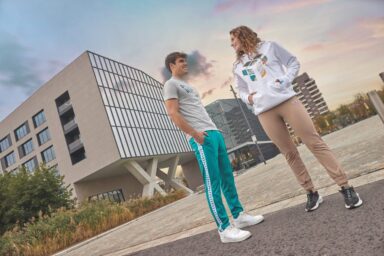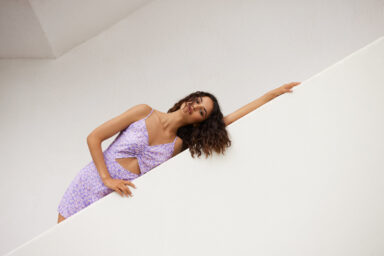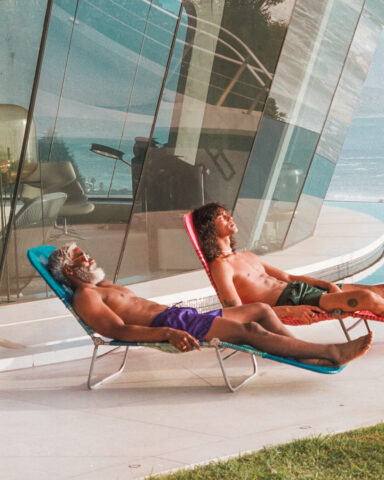Meeting Jessica Long is like diving into a pool with her, feeling the water against your shoulders, spreading your arms to move swiftly in an element that seems to be a part of her. That’s how our conversation begins, with a big smile lighting up her face, revealing her vitality
words Emanuela Zini
Alongside her athletic successes, she wants to share her personal struggles and triumphs, including her journey to find identity, experiences with bullying, and relationships with family and friends. Jessica has authored books; her resilience and positive attitude shine through her words, inspiring readers to overcome their own challenges and pursue their dreams.
Jessica’s story serves as a reminder of the regenerative power of sports and that with perseverance and self-belief, anything is possible, even for a “mermaid without a tail.”
Jessica, how would you like to introduce yourself?
I’m a Paralympic swimmer, but more than anything, I love swimming. I’m so proud of everything I’ve accomplished in the water! But I’m much more than just a swimmer, and it took me a long time to realize that. I love interior design, I’m happily married, I adore my dog, and, well, I just love swimming too.
Swimming is an integral part of your life. What goes through your mind when you’re on the starting block, waiting to dive into a race?
I’m focused. I think about all the hard work I’ve put in, all the training, knowing how to swim… Then I hit the water, and everything becomes a part of me. Swimming has significantly contributed to my self-confidence. Before discovering swimming or the Paralympics, I never showed my legs, never wore shorts. It’s so strange because, you know, when I think about that kid who refused to wear anything but long pants, I wish I could hug her. Then I think about myself today; I don’t know where I’d be without sports, without swimming giving me the confidence to face life and the world as an amputee.
I’ve always wanted to be someone, not just a good person; I dreamed of doing great things. So when I discovered the Paralympics, I decided I had to be the best. When I’m behind that block, about to start, I’m aware that I’m very capable. Being part of Team USA and Team arena and being an ambassador mean so much to me, and I don’t take it lightly. I’ve really, really worked hard to be a role model.
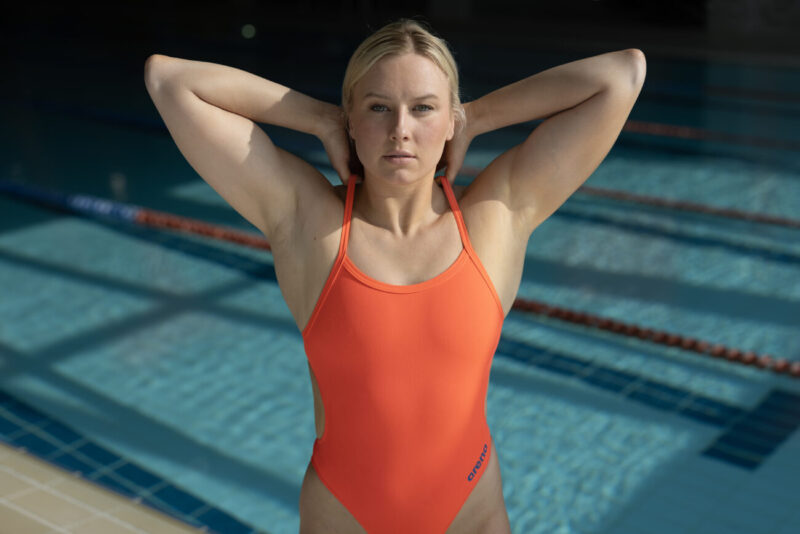
So, do you think about the responsibility of the outcome?
Yes, at this point, I’m really happy with what I’ve achieved, but there was a time when I wasn’t proud of myself. There was a time when I won my first bronze medal, I was 16 years old, and after the race, I went up to the stands to meet my family with the medal around my neck, which we now call our “pink medal.” But at the time, as a sixteen-year-old, I thought it was the end of the world, I wanted to throw it away. I didn’t want to keep it. I thought I had failed and started crying, asking them if they still loved me… My parents never cared about swimming or my success; they just wanted me to be myself, to engage in sports. They taught me that if I made a commitment, even when things got tough, I still had to push through.
Jessica, you’re preparing for the Paris Paralympics. How do you feel?
I’m proud of the results I’ve achieved, and in Paris, like anywhere else, whatever happens, whether I win all the gold medals or have none, I’ll still be proud of myself.
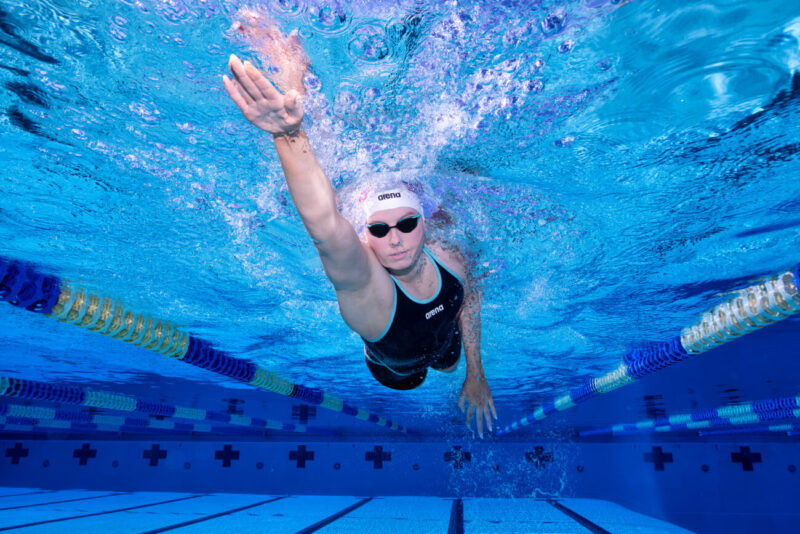
When you swim, what feeling prevails?
I feel free. Throughout my life, being born without legs, I’ve had about 25 surgeries. I had to learn to walk and climb stairs so many times, and when I finally succeeded, I’d end up back in the operating room… So for me, water has always been a place of freedom but also a place to feel powerful, very powerful, and I love competing. I don’t have legs to kick, but I’ve learned how to dominate the water using my arms with strength. I loved being part of the team and how they treated me; they never made fun of me, no one ever really teased me because of my legs, there was a lot of respect. Returning to your question, I’d say the prevailing sensation is freedom, but swimming has also allowed me to feel very powerful and capable, and I carry this strength with me in everyday life.
I have five pairs of legs; these you see are the ones I wear every day, but I also have more technical legs that look very robotic, and sometimes it’s still really hard to wear them. I’m comfortable with my legs now, but that doesn’t mean some days aren’t harder, and I feel like hiding my disability. But I’ve decided that the best way to overcome those tough days is to face the world and take my rightful place.
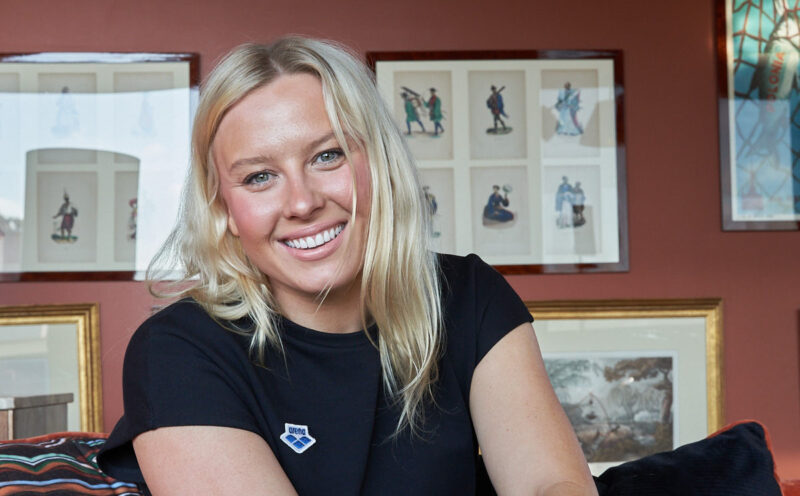
For many, you’re an example, a hero. Do you see yourself in this role?
Like many women in sports who can be an example, I feel the same way. Can I be someone who seems like a hero? Certainly, I hope to be a hero especially for all the young Paralympic athletes. It’s been incredible in the past few days; I competed for about 4 days, I don’t even know where I was, but it was amazing to see little girls looking at me, with my arena mermaid swimsuit, and to see so many young Paralympic athletes wearing the same swimsuit as me! It was really sweet and very special. For me, comparison is an important moment; having a disability and especially being a young girl can be really hard. I want to be a role model to show younger girls that they can do anything and can be strong, incredible, and be a leader. When you have confidence in yourself, you somehow become a leader; you can have a very important place in the world and be an example to others. The Paralympic movement has made a lot of progress; it’s been a long journey, there are still things to do, but I’m really excited to see the difference from when I was 12 to today when I’m 32. I’m proud to have contributed to the growth of the movement that offers opportunities for so many young swimmers.
Trying to be an example is what drove you to write your books?
I wanted to share my experience, my journey. I think we can learn so much from each other, and stories are so powerful! I wanted to write a story that was really impactful, and the mermaid without a tail is the story of my life described in a children’s book. The big message, the thing that makes you different, is your greatest gift. I don’t think I ever thought that not having legs was my greatest gift because it caused me so much pain… but I think I’ve done more without my legs than I could have achieved with two legs… if I had two legs, I wouldn’t be here in Milan sharing my story with you, so it’s a matter of perspective.
I imagine your journey hasn’t been without pain? Where did you find the strength?
The pain will always be there; our bodies weren’t made to not have legs or to wear prosthetics that weigh about 7 pounds, imagine your shoes that you wear every day and weigh 7 pounds, every step you take is a heavy step, but I’m so used to it… it was much harder when I was younger, and I think if I could give a message to younger girls, I would advise them not to give up, I would tell them to keep going, when you’re young, you can’t see the big picture of your life, just keep moving forward, anyway.
